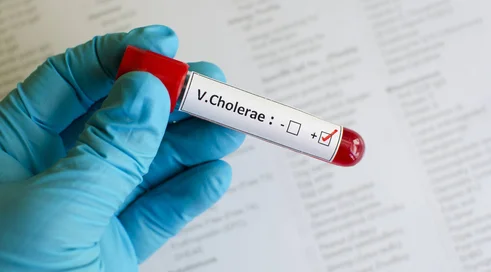3 dangerous diseases you will avoid by washing fruits

Published May 12, 2023 13:00

Stowaways
At first glance, strawberries growing on a bed or berries in the forest seem clean to us, at most dusted with sand or soil. However, there is a lot of life on them: bacteria (salmonella, e.coli), fungi, and sometimes larvae and eggs of parasites. We can throw another one in there ourselves if we pick and eat fruit with dirty hands, play in the sand with children or stroke a four-legged pet. It is estimated that more than 70 percent of all poisonings worldwide are the result of a lack of hygiene, meaning that we don't wash our hands before eating. The microorganisms lead to bothersome but relatively mild symptoms - diarrhea, vomiting, abdominal pain, fever. Such symptoms can appear right after a meal, but just as well the next day. In such a case, care should be taken to take in adequate amounts of fluids, as the discomfort can lead to dehydration, which is particularly dangerous for children.
Far more dangerous consequences for health are long-developing parasitic zoonotic diseases such as echinococcosis, toxoplasmosis or toxocariasis. In their case, one can even speak of life-threatening.
Going berry picking
Forest fruits are the most common source of infection with echinococcosis - a disease caused by tiny, several-millimeter-long, single- and multi-mammalian tapeworms, Echinococcus genus. Their carriers are foxes, wolves, less frequently raccoons (which are not yet found everywhere in Poland) and dogs and cats (hence you can get infected not only in the forest). Humans are their intermediate hosts, accidentally infecting themselves by eating unwashed fruit, on which there are echinococcus eggs. It is also possible, though less common, to become infected through contact with contaminated soil or water, or possibly through touch - foxes and wolves are unlikely to be stroked, but tapeworm eggs can be found in saliva, as well as on dog fur. They are very viable - they can wait in the soil for a year for a host, and, for example, the temperature of minus 70 degrees kills them only after a few days, so they are encountered even near the Arctic Circle! They are excreted by animals in feces, so the most dangerous is to eat unwashed fruits that grow low - black berries and strawberries. Therefore, less risk of infection is given by eating raspberries or blackberries.
Aliens in our bodies
From an eaten tapeworm egg, a larva hatches and travels through the host's bloodstream, looking for a place to nest. It doesn't have to happen if the body is highly immune. The larva most often ends up in the liver (60 percent of cases), lungs or brain, less often in the spleen or bones. It forms a "protective zone" around itself: a fluid-filled cyst that can be up to 30 cm in diameter! The cyst presses on other organs, causing nausea, pain, and its rupture threatens death. The worst is if the parasite nests in the liver - echinococcosis then devastates the body very quickly, acting similarly to metastatic cancer (multicyst echinococci do not form cysts in the liver, but sprout into other organs). 90 percent of untreated cases end in death.
The affected lungs cause coughing, shortness of breath, chest pain, and blood spitting may occur. From the lungs, the parasite spreads to other organs. The tapeworm in the brain, on the other hand, initially causes worsening headaches, visual disturbances, but over time damages this important organ, leading to various mental disorders and epileptic seizures.
Echinococcosis develops for months, sometimes years, there are cases when it does not give significant symptoms for 10-15 years, hence it is very difficult to diagnose it. Ultrasound, X-ray, serological blood tests and CT scans are helpful. It is often confused with cancer. Surgery is usually required, in the case of a liver transplant, followed by a treatment that lasts for months to destroy the parasites, as echinococcosis tends to recur. Less commonly, chemotherapy is used or the cyst is punctured and antiparasitic agents applied to it. Although only a few dozen cases of echinococcosis are reported in Poland each year, the disease is so dangerous that it is better to guard against it and follow simple hygiene rules.
Cat stuff
Toxoplasmosis is caused by the protozoan parasite Toxoplasma gondii. Their ultimate host is felines, mainly domestic cats, and it is through them that the disease spreads, but intermediate hosts can be all mammals and birds. It is one of the most common parasitic infections. Some statistics say that up to 50 percent of the world's population may be infected. Fortunately, most people are only carriers and never contract toxoplasmosis. Most often we get infected by eating raw or underdone meat. In this case, an inaccurately washed cutting board or knife can also be a source of infection. The infection can also be contracted through contact with soil on which cat feces were found, such as in a sandbox or on a city beach - protozoan oocysts, excreted with feces, can survive there for up to 2 years! You can also become infected by eating unwashed fruit - especially strawberries - from beds that have been visited by cats (although the oocysts could just as well have been carried there on paws by other animals or insects). The first symptoms, which may not occur at all in people with good immunity, resemble the flu: fever, enlarged lymph nodes, joint pains, headaches. They pass after 4-6 weeks. For people with weak immunity (e.g., AIDS patients, undergoing immunosuppressive treatment), complications occur: meningitis and encephalitis, inflammation of lymph nodes, liver, changes in the lungs and heart muscle, visual disturbances.
It might seem that toxoplasmosis for most people is therefore not particularly dangerous. Yes, unless it affects a pregnant woman: the disease leads to serious malformations of the baby and miscarriages. The protozoan destroys the central nervous system of the fetus, as well as the vascular membranes of the eye. Developmental defects in newborns are incurable. Infection of the fetus occurs only in the case of primary infection, that is, when the woman did not have toxoplasmosis before becoming pregnant, so women planning to become pregnant should get tested for IgG antibodies indicative of the disease. If they are seronegative, the tests are best repeated every trimester during pregnancy). The most serious symptoms appear when the fetus becomes infected in the first and second trimesters; in the third trimester they are milder or do not appear at all.
In this case - being pregnant or planning a pregnancy - is it necessary to get rid of the cat? No, but it's best to get him tested - if he's seropositive, he's no longer spreading oocysts and his company is perfectly safe. In addition, oocysts acquire the ability to infect after at least 24 hours after excretion, so a regularly cleaned litter box is also not a threat. If a cat is seronegative, it should not freely leave the house and hunt, nor should it be fed raw meat.
Toxoplasmosis is treated with antiparasitic drugs and antibiotics; therapy is needed for pregnant women, infants, people with immunosuppression, toxoplasmosis affecting the organ of vision or so-called chronic toxoplasmosis. In other cases, it passes spontaneously.
The sandbox of fear
More than 60 percent of soil samples from sandboxes, backyards and city parks in Poland have been found to be contaminated with eggs of nematodes of the Toxocara genus, or dog and cat roundworms - an infected animal sheds about 200,000 of them a day! The spread of eggs could easily be prevented by deworming pets, cleaning up after them and moving them to more desolate places. They cause toxocariasis, a parasitic disease to which children in particular are exposed, who put their hands and toys in their mouths while playing in the sand, or eat with dirty hands. It is also relatively common to find eggs on unwashed vegetables and fruits that have come into contact with infected soil. The eggs hatch into larvae that settle in various organs, most often in the liver, which happens to be a bad choice for them, and most of them die. The rest, however, migrate further (which is why the disease is also called visceral wandering larvae syndrome), toward more favorable environments: the eyeball, lungs, brain, less often the heart or spinal cord, where they can live for up to several years. Toxocariasis is most often asymptomatic, but if it attacks the eyes, it can cause vision damage and even loss of vision. A roundworm in the brain often causes inflammation of the brain, as well as seizures and sensory disturbances, while one nested in the lungs causes coughing, shortness of breath and alveolitis. Severe infection manifests as fever, weakness, rashes, cough, leukocytosis, and liver enlargement. In all types of toxocariasis, lack of treatment leads to irreversible damage to the tissues where the parasite resided. Making an accurate diagnosis is difficult (asthma, allergies are often diagnosed), and treatment with antiparasitic agents is lengthy - sometimes dragging on for months.
Quarantine for fruit
There is much debate as to whether it is better to wash fruits in cold or warm water. Doctors point out that pesticides remain on many fruits, especially those growing in cultivated fields, and sold, for example, at markets (where we are subjected to temptations such as "You taste it, how delicious") and in stores, forming a kind of oily coating. Neither cold nor hot water will wash it off, you need an acidic liquid, so water mixed with vinegar, lemon juice or citric acid - rinsing fruit in it for 2-3 minutes should kill any bacteria. The pesticides themselves, on the other hand, will not remove, for this you need another bath, this time in an alkaline solution of water with baking soda. The fruit should then be rinsed thoroughly in clean water and dried. Another way is to quarantine the fruits in water with salt and lemon juice or citric acid - it is advised to leave them in it for about 5-10 minutes. You can also buy special organic liquids for washing and disinfecting fruits and vegetables - they contain no chemicals, are odorless, tasteless and do not harm children. When it comes to fruits from your own garden or coming from a forest glade far away from cultivated fields, you do not need to make such laborious efforts: here a thorough washing in running water will work, which will remove tiny unwanted guests. Of course, it is essential to wash your hands before eating the fruit, otherwise all the effort will be in vain.
Topics
owoce / pasożyty / tasiemiec / bąblowica / toksokaroza / choroby zakaźne / choroby pasożytnicze / toksoplasmoza / glistnica

















